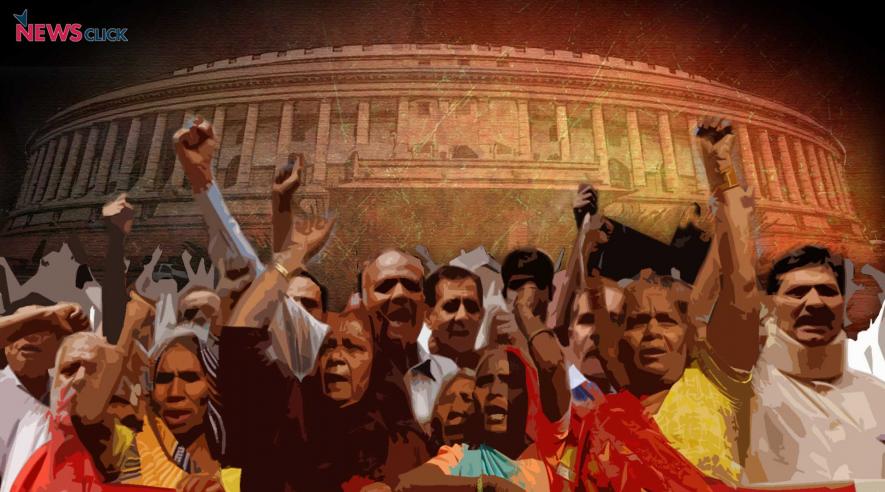Lakhs of Angry Workers Get Ready to Storm Delhi on 9-11 November

Newsclick Image by Nitesh Kumar
An estimated 3 lakh workers from across the country are preparing to travel to Delhi on 9-11 November 2017 for a massive show of strength and anger at hostile govt. policies. This will be the biggest such protest - popularly known as a ‘maha-padav’ - in the Capital in decades and comes as a culmination of years of discontent and repeated betrayal by the govt. in considering increase of wages, protection of jobs and provision of basic rights like affordable food, healthcare and education.
Working people’s anger against the present govt. appears to be coming to a boil with the 30 October torchlight protests by the joint platform of farmers, agricultural labourers, trade unions and various civil society groups preceding the maha-padav and a giant march to Parliament by farmers following it.
After the massive workers’ march to Parliament in December 2013, there have been two countrywide general strikes in 2015 and 2016 on these demands, besides militant strike actions by coal, steel, port, transport, tea estates workers, and a series of protests by anganwadi workers/helpers, ASHAs, mid day meal workers, etc. Govt. employees too have been on the war path with several actions in the recent past.
The call for this November’s unprecedented protest has been given jointly by all central trade unions of the country except the one associated with the ruling BJP. Most big federations of employees like steel, coal, port and dock etc. as well as bank, insurance and govt. employees are also participating. An important contingent of the protest is what are called ‘scheme workers’ – over 50 lakh workers, mostly women, employed by the govt. to run diverse govt. schemes like anganwadis, mid day meals for schools, healthcare delivery workers etc.
In the run up to the maha-padav, industrial areas, offices, commercial complexes and workers’ colonies across the country have been witnessing an electrifying campaign of mobilization by the trade unions and federations. Public meetings, dharnas, processions have been held and all reports indicate that there is huge support for the move that will pose a big challenge to the Modi govt. at the Centre.
Some of the key demands in the workers 12-point demand charter include:
National minimum wage of Rs.18,000: currently, statutory wages in the vast small and medium sector range between Rs.8000-Rs.12,000, with some areas like Delhi having a higher wage. But most of this is on paper as employers refuse to implement laws and govt. refuses to penalize them for violations. With zooming prices, prevailing minimum wages are a fraction of what is needed for a life of dignity. Contract workers are even worse off getting half of what regular employees get, without any other protection.
Control rising prices and PDS: Any measly rise in wages is washed away by ever rising prices of food items, healthcare and education, among other things. Relief in the form of a universal and robust public distribution system has been scuppered by govt.’s attempts to weaken and dilute the existing system. Workers are demanding strong punitive action against hoarders and black marketeers of food items like pulses and vegetables, inclusion of all essential items under PDS with controlled prices, and a universal coverage of the PDS to include every family.
Prevent rising unemployment: Joblessness is at a decade high, aggravated by throwing out of workers from various units in IT, steel, and other sectors and the slowdown caused by the note-bandi and GST double whammy. This is being used to depress wages, and also poses a threat of rising diversion by RSS-BJP in to divisive activities like communalism or caste based agitations. Workers are demanding a complete overhaul of policies to spur industrialization and protect existing jobs.
Social Security: Indian workers continue to be one of the most deprived in terms of social security benefits like healthy coverage, provident fund, retirement pension, unemployment benefits, accident benefits and compensation, etc. Workers are demanding universal coverage under a state umbrella, not through profit gouging private insurance companies.
Protection of Labour Laws: In order to prevent workers from organizing and protesting, and equally, to ensure unbridled exploitation and profit making by their employers, changes are being made in existing labour laws. Included are ket changes to ease hiring and firing of workers. This comes in the context of vociferous demands by industrialist bodies for such changes. The protesting workers are demanding that while rolling back these changes, govt. should actually strengthen the labour law implementation machinery and protect small, unorganized sector workers also.
End to privatization: The govt. has been going ahead with disinvestment of public sector assets by selling off shares to private parties, often cronies of the ruling politicians. Besides being open loot of national assets, this inevitably means an attack on workers through job losses or insecurity, wage freezes and general deterioration of working conditions.
Disclaimer: The views expressed here are the author's personal views, and do not necessarily represent the views of Newsclick.
Get the latest reports & analysis with people's perspective on Protests, movements & deep analytical videos, discussions of the current affairs in your Telegram app. Subscribe to NewsClick's Telegram channel & get Real-Time updates on stories, as they get published on our website.
























